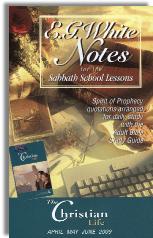|
||||||||||||||
Commentary on "Revelation"
Day 3: Monday, April 27, 2009
Overview
“Conscience” is sometimes defined as the faculty, or inward principle, that helps us decide between right and wrong. Even those who do not believe in God usually possess some insight into what is morally acceptable and what must be rejected.”
Problems
What does “conscience” have to do with God’s revelation? At best, it is fallible, tainted by indwelling sin. At worst, it has been so malconditioned by unbelief that it no longer functions at all. All of the examples given in this lesson bear this out.
Reading the Bible and praying will do nothing to improve the conscience as a means of God communicating with us, UNLESS the person who is reading and praying is already indwelt by the Holy Spirit as a result of being saved. Nowhere in this entire lesson is this point made clear.
If this part of the lesson had been presented similar to C. S. Lewis’ argument in Mere Christianity (as an example of natural law in our world; that is, the universal idea that murder, however defined, is bad, and thus an argument in favor of God’s existence) then the lesson would have been on the right track. Conscience cannot, of itself, lead one to a saving knowledge of Jesus Christ. It can tell us that things ought not to be the way they are, but that’s the extent of it.
Rather than following Lewis’ line of reasoning, the author of this lesson is presenting one more red herring argument as a set up to Mrs. White being an absolute necessity in the life of an Adventist. The author misses the point of Romans 1-3 entirely.
For Paul, it simply didn’t matter whether a Gentile could look at nature (Sunday’s lesson) to see God, had an informed conscience (this lesson) and was thus a law unto himself, or if a Jew understood the benefit of the Law. For Paul, the point of the first three chapters of his letter is that “now apart from the Law the righteousness of God has been manifested, being witnessed by the Law and the Prophets, even the righteousness of God through faith in Jesus Christ for all who believe; for there is no distinction; for all have sinned and fall short of the glory of God, being justified as a gift by His grace through the redemption which is in Christ Jesus; whom God displayed publicly as a propitiation in His blood through faith. This was to demonstrate His righteousness, because in the forbearance of God He passed over the sins previously committed; for the demonstration, I say, of His righteousness at the present time, so that He would be just and the justifier of the one who has faith in Jesus” (Romans 3:21-16 NASB).
Paul always pointed to Jesus. The SDA church always points to behaviorism.
Summary
- Conscience cannot be counted upon to reveal anything about God.
- Behavior, even good behavior like reading the Bible and praying, will not improve a person’s communication with God via the conscience.
- Only a saved person, that is, a person indwelt by the Holy Spirit, can understand what the Bible means.
- A saved person does not need Ellen White to explain the Bible (as will be argued in the next section).
- Picking out small portions of Paul’s reasoning in Romans 1-3, as done in this lesson and the previous one, misses his point completely and leads to confusion regarding God’s communication with us through Jesus.
Copyright 2008 BibleStudiesForAdventists.com. All rights reserved. Revised April 25, 2009. This website is published by Life Assurance Ministries, Glendale, Arizona, USA, the publisher of Proclamation! Magazine. Contact email: BibleStudiesForAdventists@gmail.com.
The Sabbath School Bible Study Guide and the corresponding E.G. White Notes are published by Pacific Press Publishing Association, which is owned and operated by the Seventh-day Adventist church. The current quarter's editions are pictured above.
Official Adventist Resources
Standard Edition Study Guide Week 5
Teacher's Edition Study Guide Week 5
Easy Reading Edition Study Guide Week 5
Search the Complete Published Ellen G. White Writings


